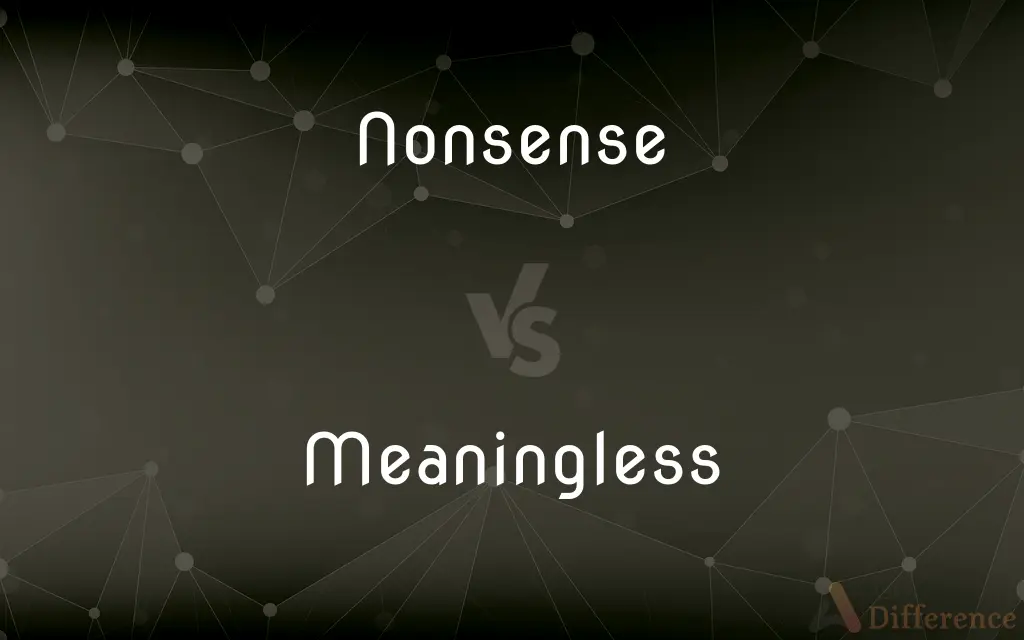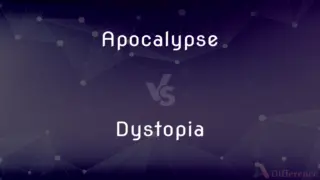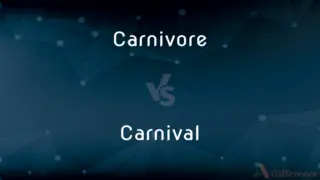Nonsense vs. Meaningless — What's the Difference?
By Maham Liaqat & Fiza Rafique — Updated on April 29, 2024
Nonsense involves absurd or meaningless content, while 'meaningless' describes something devoid of purpose or significance.

Difference Between Nonsense and Meaningless
Table of Contents
ADVERTISEMENT
Key Differences
Nonsense often refers to words or ideas that lack logical consistency or sense, often intentionally absurd or comical. Whereas, meaningless specifically denotes a lack of meaning or relevance, whether or not it tries to be logical.
Nonsense can sometimes have a purpose in literature or humor, providing entertainment or satirical commentary. On the other hand, meaningless items or statements typically offer no value or function, serving no discernible purpose.
Nonsense is often used to criticize content that fails to follow expected logical or societal norms. Whereas, meaningless is used to describe something that does not convey any message or worth to the observer or listener.
Nonsense may still engage an audience through its playful manipulation of language and norms. On the other hand, something meaningless might fail to engage or affect the audience at all due to its lack of inherent value or interest.
Nonsense can be creative or artful, such as in works of Lewis Carroll or Edward Lear. Whereas, meaningless is typically flat and uninspiring, lacking the creative element that nonsense might playfully exploit.
ADVERTISEMENT
Comparison Chart
Definition
Absurd or illogical content
Lacking purpose or significance
Usage in language
Often intentional, creative
Often unintentional, stark
Emotional engagement
Can be humorous or satirical
Generally disengaging
Example in literature
"Jabberwocky" by Lewis Carroll
Statements without context
Impact on communication
Can provoke thought or amusement
Often leads to confusion or disinterest
Compare with Definitions
Nonsense
Speech or writing with no meaning; used especially for humorous effect.
The script was complete nonsense but amusing.
Meaningless
Having no meaning or an unclear meaning.
The text was garbled and meaningless.
Nonsense
Meaningless or unintelligible talk or ideas.
She said a lot of nonsense during the debate.
Meaningless
Failing to elicit a specific reaction or response.
Her apology felt meaningless and insincere.
Nonsense
Things that are ridiculous and make no sense.
His excuse for being late was sheer nonsense.
Meaningless
Not conveying any intended or comprehensible message.
Without proper context, the instructions were meaningless.
Nonsense
Foolish or unacceptable behavior.
I will not put up with this nonsense any longer.
Meaningless
Not involving meaningful or purposeful action or thought.
The discussion seemed meaningless and repetitive.
Nonsense
Something excellent, often an unexpectedly successful event.
The party was total nonsense!
Meaningless
Lacking in purpose, significance, or value.
His response to my question was completely meaningless.
Nonsense
Nonsense is a communication, via speech, writing, or any other symbolic system, that lacks any coherent meaning. Sometimes in ordinary usage, nonsense is synonymous with absurdity or the ridiculous.
Meaningless
Having no meaning or significance.
Nonsense
Words or signs having no intelligible meaning
A message that was nonsense until decoded.
Meaningless
Lacking meaning.
The word "gugugu" is meaningless in English.
Nonsense
Subject matter, behavior, or language that is foolish or absurd.
Meaningless
Insignificant; not worthy of importance.
All our efforts were ultimately meaningless.
Nonsense
Extravagant foolishness or frivolity
A clown's exuberant nonsense.
Meaningless
Having no meaning; of no value; as, a meaningless endeavor; a meaningless life; a meaningless explanation. Opposite of meaningful.
Nonsense
Matter of little or no importance or usefulness
A chatty letter full of gossip and nonsense.
Meaningless
Having no meaning or direction or purpose;
A meaningless endeavor
A meaningless life
A verbose but meaningless explanation
Nonsense
Insolent talk or behavior; impudence
Wouldn't take any nonsense from the children.
Nonsense
(Genetics) Of or relating to a mutation in a structural gene that changes a nucleotide triplet into a stop codon, thus prematurely terminating the polypeptide chain during protein synthesis.
Nonsense
Used to express disagreement or exasperation.
Nonsense
Letters or words, in writing or speech, that have no meaning or pattern or seem to have no meaning.
After my father had a stroke, every time he tried to talk, it sounded like nonsense.
Nonsense
An untrue statement.
He says that I stole his computer, but that's just nonsense.
Nonsense
That which is silly, illogical and lacks any meaning, reason or value; that which does not make sense.
Nonsense
Something foolish.
Nonsense
(literature) A type of poetry that contains strange or surreal ideas, as, for example, that written by Edward Lear.
Nonsense
(biology) A damaged DNA sequence whose products are not biologically active, that is, that does nothing.
Nonsense
To make nonsense of;
Nonsense
To attempt to dismiss as nonsense; to ignore or belittle the significance of something; to render unimportant or puny.
Nonsense
(intransitive) To joke around, to waste time
Nonsense
Nonsensical.
Nonsense
(biochemistry) Resulting from the substitution of a nucleotide in a sense codon, causing it to become a stop codon (not coding for an amino-acid).
Nonsense
An emphatic rejection of something one has just heard and does not believe or agree with.
Nonsense
That which is not sense, or has no sense; words, or language, which have no meaning, or which convey no intelligible ideas; absurdity.
Nonsense
Trifles; things of no importance.
Nonsense
A message that seems to convey no meaning
Nonsense
Ornamental objects of no great value
Nonsense
Having no intelligible meaning;
Nonsense syllables
A nonsensical jumble of words
Common Curiosities
What is the primary distinction between nonsense and meaningless?
Nonsense typically involves absurdity or illogical elements, often for effect, whereas meaningless refers to a lack of significance or value.
Is meaningless always negative?
Often it is perceived negatively, as it implies something lacks purpose or value, but it can be neutral depending on context.
Are there any positive uses for meaningless statements or texts?
In some cases, meaningless texts can serve artistic or philosophical purposes, questioning the nature of meaning itself or encouraging personal interpretation.
How do nonsense and meaningless function differently in communication?
Nonsense might provoke thought, amusement, or irritation, while meaningless content tends to disengage or confuse the audience.
Can something be both nonsense and meaningless?
Yes, something can be both if it is absurd and also lacks any discernible purpose or value.
What is an example of nonsense being used effectively in popular culture?
Nonsense is effectively used in "Alice's Adventures in Wonderland" where it challenges perceptions and entertains through its absurdity and wit.
How do audiences typically react to nonsense compared to meaningless content?
Audiences might find nonsense amusing, intriguing, or confusing, but often find meaningless content disengaging or frustrating.
Can nonsense ever be meaningful?
Yes, nonsense can be meaningful especially in literature or art where it is used to challenge norms or entertain.
What role does context play in determining if something is nonsense or meaningless?
Context is crucial; nonsense might be understood and appreciated within a specific context (like satire), while something deemed meaningless might lack relevance or coherence regardless of context.
Why might an author choose to use nonsense in their writing?
Authors might use nonsense to play with language, entertain, provoke thought, or satirically criticize societal norms or logic.
How can something that is meaningless affect communication?
Meaningless elements in communication can lead to misunderstandings, reduced engagement, or frustration due to the lack of clear purpose or significance.
What strategies can be used to interpret nonsense or meaningless statements?
Strategies include analyzing the context, exploring the author's intent, and considering cultural and linguistic norms to find potential underlying meanings or purposes.
How do educational settings handle nonsense versus meaningless content?
Educational settings might explore nonsense in creative writing or literature classes, while actively discouraging meaningless content in academic writing or serious discourse.
Is it easier to create nonsense or meaningless content?
It may be easier to create meaningless content by omitting purpose or context, whereas crafting effective nonsense often requires a deliberate play on words, ideas, or established norms.
Can the perception of what is nonsense or meaningless change over time?
Yes, cultural and contextual shifts can alter perceptions, with what was once seen as nonsense or meaningless gaining recognition or relevance under new interpretations.
Share Your Discovery

Previous Comparison
Apocalypse vs. Dystopia
Next Comparison
Carnivore vs. CarnivalAuthor Spotlight
Written by
Maham LiaqatCo-written by
Fiza RafiqueFiza Rafique is a skilled content writer at AskDifference.com, where she meticulously refines and enhances written pieces. Drawing from her vast editorial expertise, Fiza ensures clarity, accuracy, and precision in every article. Passionate about language, she continually seeks to elevate the quality of content for readers worldwide.
















































